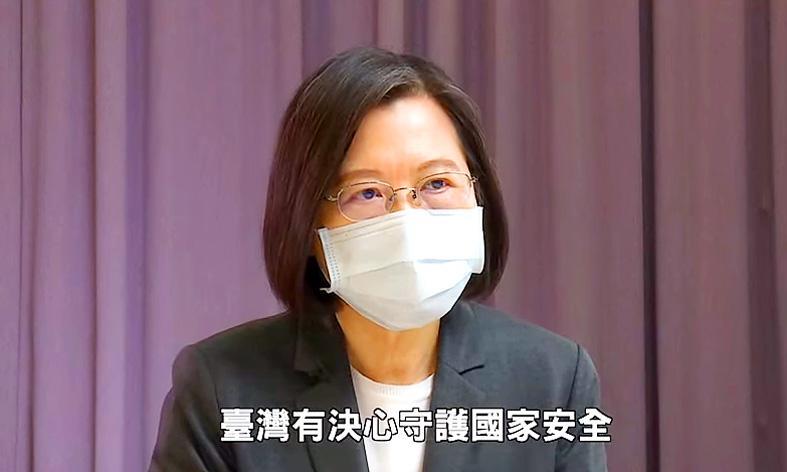Taiwanese will demonstrate to the world that their nation is capable of defending its sovereignty and ensure that the future of Taiwan will be decided by its people, President Tsai Ing-wen (蔡英文) and Vice President William Lai (賴清德) said yesterday in pre-recorded remarks at the Global Taiwan National Affairs Symposium.
Organized by Taiwanese independence groups, the symposium was themed “Uphold Taiwanese sovereignty, promote Indo-Pacific alliances.”
After the COVID-19 pandemic has caused changes to world affairs, the Russia-Ukraine war has shown that authoritarian states pose a threat to democracy, Tsai said, adding that many media reports have compared Taiwan to Ukraine.

Screen grab from YouTube
Taiwan is seeking to uphold its sovereignty, safeguard democracy and stand firm with nations that have similar values and ideals, she said, citing Taiwan’s assistance to Ukraine through donations and medical equipment as an example.
The solidarity of Taiwanese over the past few years has contributed to the development of Taiwan’s national defense industry and its overall economy, Tsai said, adding that only by growing stronger can Taiwan help others.
Increasingly more nations are speaking up for Taiwan and supporting its meaningful participation in international organizations, Tsai said.
“We have shown the world that we are resolved to defend ourselves, and that we can contribute to efforts to further freedom and democracy,” she said.
Lai called on the event for a moment of silence to honor late democracy pioneer Peng Ming-min (彭明敏) and to thank him for his contribution to furthering Taiwanese democracy.
Peng passed away at the age of 98 on Saturday last week. He and two of his students in 1964 published a manifesto, A Declaration of Formosan Self-Salvation, in which he and his coauthors said that Chiang Kai-shek’s (蔣介石) dream of “retaking the mainland” is unattainable. The declaration advocated for a “one Taiwan, one China” policy, a new constitution, joining the UN as “Taiwan” and creating a free nation.
Lai said that over the past few years, Taiwan’s standing has improved, despite global challenges and Chinese oppression, and it has bolstered collaboration with other countries in the Indo-Pacific region, as well as with the US and the EU.
Many international summits calling for “stability in the Taiwan Strait” is a sign of success for Taiwan’s diplomacy, he said.
Taiwan-US ties have improved greatly, including through former US secretary of state Mike Pompeo’s statements of support for Taiwan, as well as a delegation sent by US President Joe Biden, which underscored the US’ interest in a stable Indo-Pacific region, the vice president said.
Taiwanese must stand united, and uphold sovereignty and democracy to ensure that only they decide their country’s future, Lai said.
Taiwan is also pursuing international collaboration on carbon emissions reduction, as the nation is doing its part to conserve the environment, he said.
Such endeavors would also make Taiwan stronger, Lai added.

A Ministry of Foreign Affairs official yesterday said that a delegation that visited China for an APEC meeting did not receive any kind of treatment that downgraded Taiwan’s sovereignty. Department of International Organizations Director-General Jonathan Sun (孫儉元) said that he and a group of ministry officials visited Shenzhen, China, to attend the APEC Informal Senior Officials’ Meeting last month. The trip went “smoothly and safely” for all Taiwanese delegates, as the Chinese side arranged the trip in accordance with long-standing practices, Sun said at the ministry’s weekly briefing. The Taiwanese group did not encounter any political suppression, he said. Sun made the remarks when

The Taiwanese passport ranked 33rd in a global listing of passports by convenience this month, rising three places from last month’s ranking, but matching its position in January last year. The Henley Passport Index, an international ranking of passports by the number of designations its holder can travel to without a visa, showed that the Taiwan passport enables holders to travel to 139 countries and territories without a visa. Singapore’s passport was ranked the most powerful with visa-free access to 192 destinations out of 227, according to the index published on Tuesday by UK-based migration investment consultancy firm Henley and Partners. Japan’s and

BROAD AGREEMENT: The two are nearing a trade deal to reduce Taiwan’s tariff to 15% and a commitment for TSMC to build five more fabs, a ‘New York Times’ report said Taiwan and the US have reached a broad consensus on a trade deal, the Executive Yuan’s Office of Trade Negotiations said yesterday, after a report said that Washington is set to reduce Taiwan’s tariff rate to 15 percent. The New York Times on Monday reported that the two nations are nearing a trade deal to reduce Taiwan’s tariff rate to 15 percent and commit Taiwan Semiconductor Manufacturing Co (TSMC, 台積電) to building at least five more facilities in the US. “The agreement, which has been under negotiation for months, is being legally scrubbed and could be announced this month,” the paper said,

MIXED SOURCING: While Taiwan is expanding domestic production, it also sources munitions overseas, as some, like M855 rounds, are cheaper than locally made ones Taiwan and the US plan to jointly produce 155mm artillery shells, as the munition is in high demand due to the Ukraine-Russia war and should be useful in Taiwan’s self-defense, Armaments Bureau Director-General Lieutenant General Lin Wen-hsiang (林文祥) told lawmakers in Taipei yesterday. Lin was responding to questions about Taiwan’s partnership with allies in producing munitions at a meeting of the legislature’s Foreign Affairs and National Defense Committee. Given the intense demand for 155mm artillery shells in Ukraine’s defense against the Russian invasion, and in light of Taiwan’s own defensive needs, Taipei and Washington plan to jointly produce 155mm shells, said Lin,